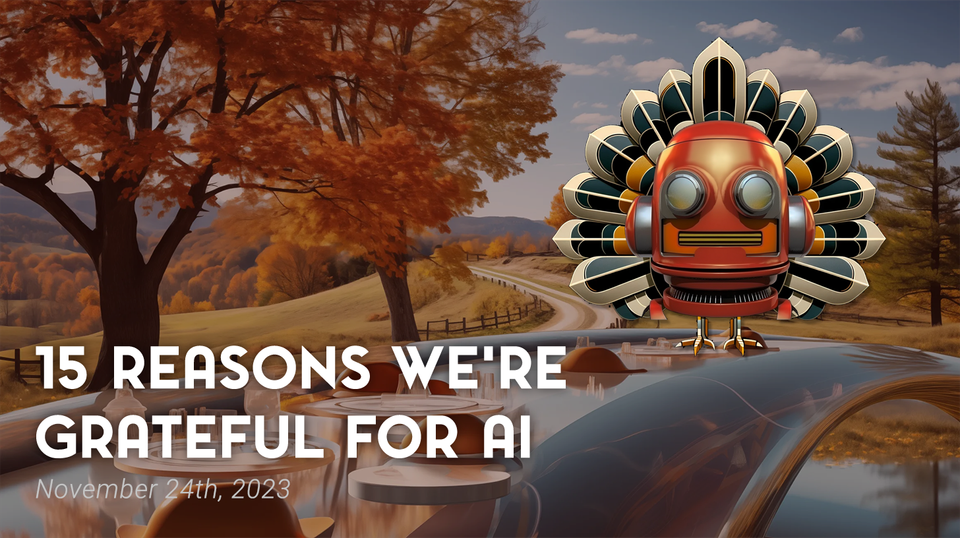15 Reasons We’re Grateful for AI


A Special Message from the AI Marketers Team
Yesterday, we celebrated Thanksgiving here in America. The holiday means something different to everyone, but generally it involves taking a step back from our daily lives to express gratitude...
...thanks for the little and big things we may take for granted the rest of the year - good health, a roof over our heads, food on the table, or time with family and friends.
We wanted to bring this same practice of gratitude to our AI Marketers community. Because the vast majority of news and commentary around artificial intelligence is negative. Often, it's downright catastrophic. And while there are many valid concerns, this innovative technology is set to transform our world for the better as well.
In fact, it already has. And we want to share some of those ways with you. That's why, in the section below, you'll find 15 reasons why we're grateful for AI. From healthcare, to education, to improving mental health, these are just a few extraordinary impacts AI is having and will have on society.
Before we get into each, we want to express how grateful we are for you.
We realize there are an endless number of newsletters out there now. So thank you for reading ours. When we started the AI Marketers newsletter, we promised to keep you on the cutting-edge of this rapidly evolving space. Today, we'd like to
re-affirm that commitment to not only maintain this standard of excellence, but improve upon it every week.
Sincerely,
The AI Marketers
5 Reasons We’re Grateful for AI
Reason #1 Diagnosing Disease Light-Years Ahead of Time
AI is radically changing how doctors spot health problems. Smart computer programs can now look at big sets of complex medical information - like detailed photos, health histories, and molecular data - to spot diseases earlier and more accurately than when relying solely on a doctor's knowledge.
Cera has launched a new AI discovery that predicts people falling at home a week before it happens, with 83% accuracy.
Reading mammograms with the help of AI software found 20% more cancers than the routine double reading by two different radiologists and didn’t increase false positives, according to a Swedish study.
Fountain Life, a health technology company, offers an AI coronary artery scan that purports to detect heart attack risk three, five or even 10 years before symptoms begin.
An AI tool called RETFound, that was trained on 1.6 million retinal scans, can detect eye diseases and predict the risk of conditions like Parkinson's, heart attacks, and strokes by analyzing images of the retina.

Reason #2: Curing Nutrient Deficiencies From Space
More than 2 billion people globally lack important vitamins and minerals that can lead to life-threatening health problems. However, doing enough lab tests to diagnose deficiencies early for treatment is difficult and expensive.
New AI technology from Harvard University can analyze free satellite pictures from space and data to accurately predict places where people lack iron, vitamin B12, vitamin A and other crucial nutrients. This could allow earlier public health actions to help prevent deficiencies in vulnerable areas without expensive tests.
Reason #3: Building A Better Education System for Students & Teachers
In South Carolina, Clemson University's School of Computing is revolutionizing K-12 education with AI. One project is creating a system to help teachers with professional development, similar to Netflix's recommendation system. This tool will use teacher surveys to provide personalized advice.
The second project focuses on creating AI-based educational modules for middle schoolers. These modules will teach math and also enlighten students about how AI algorithms track their online activities. These modules, used in physical classrooms, will be accessible through school-issued electronic devices, offering a unique learning experience.
Reason #4: Managing Mental Health (Before it’s Too Late)
AI technology is starting to help doctors better spot mental health problems in patients. In the UK, one such tool conducts online interviews with patients and analyzes their responses, accurately identifying various disorders 93% of the time.
Another US system listens to patients talk for a short time and detects signs of depression and anxiety from their voice patterns. These new ways of screening people with AI are helping doctors treat more patients faster as demand grows.
Reason #5 Helping Farmers Feed the Future
AI can optimize irrigation systems to only water crops when needed and find leaks, monitor crop and soil health to detect problems early, and identify weeds and pests so farmers spray pesticides more precisely. The tech uses data from sensors in the ground, satellite images, and drone cameras to analyze what's happening in every part of the farm.
Over time, the savings on water, pesticides, and the increase in crop yield will provide more food for our people...at more affordable prices.

Reason #6: Making the Roads Safer
The U.S. department of Transportation estimates that AI-powered fully autonomous vehicles, also known as self-driving cars, could reduce traffic fatalities by up to 94%.
And that’s just by eliminating accidents that are due to human error. Which they found could save 352,133 lives in the US and millions more worldwide.
Reason #7: Revolutionizing Weight Loss through Personalized Fitness
Companies like Alfie Health are helping folks lose weight through AI and video visits with health providers. Their AI system reviews each patient's medical information and daily habits, creating a personalized weight loss plan. The plan can suggest lifestyle changes like eating healthier foods or exercising more and prescribe weight loss medications when appropriate.
“We use a proprietary AI clinical decision support tool that allows us to understand what underlying issues patients have that is causing them to gain weight, and then recommend a combination of precision medicine and behavioral change that is unique to each patient to help them sustainably lose weight,” said Alexander Singh, CEO and co-founder of Alfie Health.
Reason #8: Unlocking the Mysteries of History
A team of scientists at LMU Munich in Germany has successfully employed AI technology to translate 300,000 lines of text in ancient languages, found on cuneiform tablets originating from ancient Mesopotamia. The researchers developed an algorithm to piece together fragments to make them understandable.
Meanwhile, DeepMedia is utilizing its text and voice platform to facilitate the integration and analysis of ancient languages. For instance, last year, the Ithaca AI system was able to decipher the gaps in ancient Greek inscriptions with 62 percent accuracy.

Reason #9: Hunting for Extraterrestrial Life
Scientists have made a significant leap in the search for extraterrestrial life by using advanced artificial intelligence (AI). This advanced AI system is adept at sifting through the vast amounts of data collected by radio telescopes, searching for specific patterns or anomalies.
Unlike older methods, this AI is trained specifically to identify signals that natural astrophysical processes cannot produce. In a remarkable discovery, the identified eight unique signals — ones that traditional algorithms had previously overlooked.
Reason #10: Developing Better Medicine, Faster
Marking a significant milestone in medical science, a groundbreaking drug, which was entirely designed by AI, has now entered clinical trials in human patients.
Developed by Insilico Medicine, a Hong Kong-based biotech startup, this drug is known as INS018_055. It specifically targets idiopathic pulmonary fibrosis (IPF), a serious lung disease characterized by scarring in the lungs, which can be fatal within a few years if left untreated. This disease currently affects about 100,000 people in the U.S. alone.
INS018_055 is distinct in being the first drug of its kind where AI was used not only to identify the drug's target but also to create its molecular design...a feat unprecedented among other AI-designed drugs currently in trials.
Reason #11: Leveling up the Sports Field
Artificial Intelligence is taking strategy and tactics to a futuristic level. For example, a joint paper by Premier League club Liverpool FC and Google’s AI laboratory Deepmind outlines the development of an Automated Video Assistant Coach (AVAC). This system, capable of processing raw broadcast video footage, can advise coaching staff in pre-match, in-game, and post-match scenarios.

Reason #12: Making Flying More Efficient & Cheaper
Using AI, Swiss International Air Lines has optimized its flight routes, leading to reduced delays and substantial cost savings. In a similar vein, Lufthansa utilizes AI systems to accurately predict wind patterns, thereby minimizing flight disruptions and enhancing punctuality for its passengers.
These advancements, echoed by airlines like Delta and JetBlue, include AI-driven scheduling and fuel management. This leads to more reliable flight times and efficient operations, directly benefiting customers with smoother travel experiences. Additionally, AI helps in setting dynamic pricing, ensuring fairer ticket prices for consumers.
Reason #13: Making Us More Efficient
According to new research from Stanford and MIT, artificial intelligence tools such as chatbots have helped increase worker productivity by 14% at some tech companies.
This study is regarded as one of the first major real-world applications of generative AI in the workplace. Over the course of a year, researchers measured the productivity of more than 5,000 customer support agents. The agents were primarily based in the Philippines and working for Fortune 500 enterprise software firms.

Reason #14: Protecting Endangered Species
Over the past decade, elephant and rhino populations have significantly declined due to poaching for their ivory tusks and horns. In response, scientists are now employing AI and drones to not only catch poachers but also to predict the animals’ movements, aiming to enhance their safety.
The AI, utilizing mathematical algorithms and data from past patrols, devises more effective routes to apprehend poachers and bolster wildlife area protection.
Reason #15: Saving the Bees
The World Bee Project, in collaboration with Oracle, is addressing the critical issue of declining bee populations — essential for the pollination of diverse crops — which are currently threatened by factors such as habitat loss, climate change, and pesticides.
Within Oracle Cloud, AI algorithms process this data, identifying factors related to hive health and potential threats, like hornet invasions. They can also alert beekeepers to issues such as swarming. This data fosters community engagement ranging from researchers to the general public.


